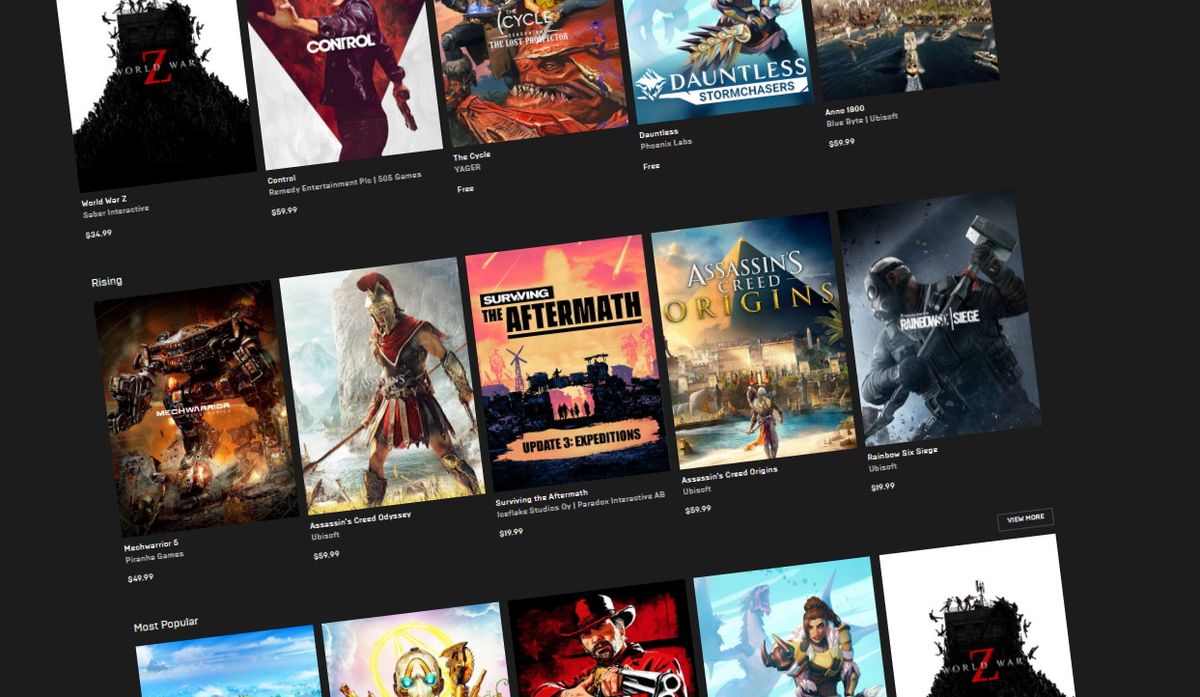No surprises in that list, thank you a lot for the data.Here's a few I found in a quick check :

Epic Games Store users claimed 749 million free games last year
Epic saw big boosts to its daily and monthly active user count.www.theverge.com

Almost 750 million free games were claimed on the Epic Games Store last year
And other highlights from the platform's 2020 year-in-review.www.pcgamer.com

The Epic Games Store is getting a lot more popular
Epic has released stats for the Epic Games Store - and they show impressive growth.www.eurogamer.net

The Epic Games Store is still mostly about Fortnite
Epic Games Store's Year In Review shows a lot of growth in 2020 for Steam's main competitor.www.rockpapershotgun.com

Epic Games Store surpasses 160 million customers
Over half of all the money spent on the Epic Games Store was on Fortnite.www.shacknews.com

The Epic Games Store now has 160 million PC users
Games saw major growth in 2020, and the Epic Games Store was no exceptionwww.pcgamesn.com

The Epic Games Store gave away nearly 750 million free games in 2020
That's an astounding number, and it seems to prove that Epic's gamble on freebies has largely paid off. Those free games – there were 103 unique giveaways...www.techspot.com

The Epic Games Store Has A Massive User Base
The Epic Games Store has just revealed its figures and player base for 2020, and the store is rapidly closing the gap with Steam.www.kotaku.com.au

2020 Was a Spectacular Year for Epic Games Store - gamepressure.com
We know how much we spent on games on Epic Games Store in 2020, and how many accounts have already been created on the platform. All thanks to the latest report.www.gamepressure.com
News Epic Games Store
- Thread starter Blizniak
- Start date
You are using an out of date browser. It may not display this or other websites correctly.
You should upgrade or use an alternative browser.
You should upgrade or use an alternative browser.
Here I wonder if I'm reading the same data as they are and if my interpretation is the wrong one, lol, it's really funny how the focus is the number of users and the freebies while at the same time they completely ignore the revenue based on third party games (PCGamer goes as far as merging the 700M with third party for some reason)Here's a few I found in a quick check :
No one truly knows what will happen, we will have to wait and see. my way of thinking is the one I posted, coexisting both.
Epic Games Store Players Up, But Spending Flat in 2020, Catalog to “Rapidly Expand” in 2021
Epic Games Store attracted new players with free games in 2020, but not a lot of new spending, but things may change in 2021.wccftech.com
Here's a critical article. It's the only one I've seen though.
I admit I'm being pessimistic about the future of Steam International in China. I hope I'm wrong.
Rock, Paper, Shotgun’s article is straight 

 www.rockpapershotgun.com
www.rockpapershotgun.com



The Epic Games Store is still mostly about Fortnite
Epic Games Store's Year In Review shows a lot of growth in 2020 for Steam's main competitor.
I boot up the Epic Games Store once every few months to play something exclusive on there (Hitman 3, this time), and to uninstall whatever game I forgot I'd downloaded the last time I was on there (Phantom Brigade, this time). I am happy Steam has competition, but as a user it offers me no incentive to use the store bar said exclusives. Meanwhile, Itch.io continues to foster types of game and a development scene that arguably wouldn't exist without it.
What's interesting to me about those articles from gaming media about the EGS numbers is how everyone of them focuses on the one metric that went up compared to 2019, the users number, but flatly ignore to tell people how revenue is nearly completely flat. It's not simply a case of being poorly researched, it's actively hiding information that could be seen as negative in anyway. Only one article, and from wccftech of all places, bothers to openly talk about that.
In addition, not one, aside from RPS, talks about these numbers in the context of Epics model of paying huge sums for exclusive games and freebies, and how little this does to make the rest of the store interesting for normal users who likely already have all they want from an actual storefront on Steam and other places. And especially good to also mention places like itch.io who actually provide a place for indies that otherwise wouldn't get featured anywhere else.
Most of these sites are American or from the UK, and what's always bothered me about news reporting there (even when we consider proper journalistic outlets) is this weird fascination with being "unbiased" to the point of ignoring the truth. I think for many of these gaming "journalists" it's similar. Epic tells them something about how they are the underdog (you know, an underdog that can afford to spend billions to manipulate the gaming market) and they lap it up. The small, valiant EGS fighting against the behemoth Steam. That's the story they all want to push, and especially when they see how many people flatly don't care about EGS, they want that story even more so. Who cares if we have to ignore basically all relevant numbers and the context of who Epic Games actually is. Nothing gets in the way of chasing the unicorn of unbiased reporting.
In addition, not one, aside from RPS, talks about these numbers in the context of Epics model of paying huge sums for exclusive games and freebies, and how little this does to make the rest of the store interesting for normal users who likely already have all they want from an actual storefront on Steam and other places. And especially good to also mention places like itch.io who actually provide a place for indies that otherwise wouldn't get featured anywhere else.
Most of these sites are American or from the UK, and what's always bothered me about news reporting there (even when we consider proper journalistic outlets) is this weird fascination with being "unbiased" to the point of ignoring the truth. I think for many of these gaming "journalists" it's similar. Epic tells them something about how they are the underdog (you know, an underdog that can afford to spend billions to manipulate the gaming market) and they lap it up. The small, valiant EGS fighting against the behemoth Steam. That's the story they all want to push, and especially when they see how many people flatly don't care about EGS, they want that story even more so. Who cares if we have to ignore basically all relevant numbers and the context of who Epic Games actually is. Nothing gets in the way of chasing the unicorn of unbiased reporting.
Here I wonder if I'm reading the same data as they are and if my interpretation is the wrong one, lol, it's really funny how the focus is the number of users and the freebies while at the same time they completely ignore the revenue based on third party games (PCGamer goes as far as merging the 700M with third party for some reason)
Even the local tech and game sites here are completely ignoring the lack of growth in revenue, while using words like "huge growth" and "closing the gap with Steam". It all reads like some paid propaganda, it's incredible! I guess all these sites are just publishing a PR mail from Epic, instead of looking at the numbers themselves.
Edit: another thing these sites are ignoring when talking about the 88/12 share is that a significant amount of games has been sold with a creator code, which means the devs have to give a percentage of their profit to the creator/streamer.
Most of these sites are American or from the UK, and what's always bothered me about news reporting there (even when we consider proper journalistic outlets) is this weird fascination with being "unbiased" to the point of ignoring the truth. I think for many of these gaming "journalists" it's similar. Epic tells them something about how they are the underdog (you know, an underdog that can afford to spend billions to manipulate the gaming market) and they lap it up. The small, valiant EGS fighting against the behemoth Steam. That's the story they all want to push, and especially when they see how many people flatly don't care about EGS, they want that story even more so. Who cares if we have to ignore basically all relevant numbers and the context of who Epic Games actually is. Nothing gets in the way of chasing the unicorn of unbiased reporting.
That's the story most of them are pushing since EGS is born, so It looks like they'd rather keep going with this narrative (as broken as it is) than taking back their own words.
Edit: another thing these sites are ignoring when talking about the 88/12 share is that a significant amount of games has been sold with a creator code, which means the devs have to give a percentage of their profit to the creator/streamer.
About that, if I remember correctly that 5% for creator codes was supposed to be paid by Epic on the first year, then by the publisher / studio. Is that right ?
The entire industry trying to gaslight people into supporting Epic and customers giving them the finger by voting with their wallets.


When you put Godfall on the list of the most popular games on your store, a game that PS5 owners seems to refuse to buy (my observations online), I kinda dont wanna know how bad other games are selling just for the sake of not making devs and pubs look bad.
Shills: "Its good for developers so you should support it!"The entire industry trying to gaslight people into supporting Epic and customers giving them the finger by voting with their wallets.

Consumers: Don't wanna
Shills: "The EGS is here to stay and you can't stop it from making a dent on Steam!"
Consumers: Don't care, not using it
Shills: "Exclusives happen all the time on consoles and we have learned to accept them!"
Consumers: Good for you, don't care
Shills: "They are giving you coupons and free games!"
Consumers: Neat, I'll take the coupons and free games exclusively
Basically all that I read from that is that 80% of that third party revenue came from Assassins Creed and Satisfactory.When you put Godfall on the list of the most popular games on your store, a game that PS5 owners seems to refuse to buy (my observations online), I kinda dont wanna know how bad other games are selling just for the sake of not making devs and pubs look bad.

The Epic Games Store gained over 52 million new users in 2020, but revenue was almost flat
The Epic Games Store's year-in-review statistics don't paint a great picture about the future of the platform.

Epic Games Store freebies are attracting tons more gamers – but they’re not spending
Apparently not, anyway, as revenue was only up very slightly in 2020
Nice to see some decent reporting, though it's telling that one of them is an normal tech site, not associated with gaming directly.
The Epic Games Store gained over 52 million new users in 2020, but revenue was almost flat
The Epic Games Store's year-in-review statistics don't paint a great picture about the future of the platform.www.vg247.com

Epic Games Store freebies are attracting tons more gamers – but they’re not spending
Apparently not, anyway, as revenue was only up very slightly in 2020www.techradar.com
Phoenix RISING
A phoenix always RISES!
Here's a few I found in a quick check :

Epic Games Store users claimed 749 million free games last year
Epic saw big boosts to its daily and monthly active user count.www.theverge.com

Almost 750 million free games were claimed on the Epic Games Store last year
And other highlights from the platform's 2020 year-in-review.www.pcgamer.com

The Epic Games Store is getting a lot more popular
Epic has released stats for the Epic Games Store - and they show impressive growth.www.eurogamer.net

The Epic Games Store is still mostly about Fortnite
Epic Games Store's Year In Review shows a lot of growth in 2020 for Steam's main competitor.www.rockpapershotgun.com

Epic Games Store surpasses 160 million customers
Over half of all the money spent on the Epic Games Store was on Fortnite.www.shacknews.com

The Epic Games Store now has 160 million PC users
Games saw major growth in 2020, and the Epic Games Store was no exceptionwww.pcgamesn.com

The Epic Games Store gave away nearly 750 million free games in 2020
That's an astounding number, and it seems to prove that Epic's gamble on freebies has largely paid off. Those free games – there were 103 unique giveaways...www.techspot.com

The Epic Games Store Has A Massive User Base
The Epic Games Store has just revealed its figures and player base for 2020, and the store is rapidly closing the gap with Steam.www.kotaku.com.au

2020 Was a Spectacular Year for Epic Games Store - gamepressure.com
We know how much we spent on games on Epic Games Store in 2020, and how many accounts have already been created on the platform. All thanks to the latest report.www.gamepressure.com
That spin is going to give me a migrane, and I don't even get those.
Looking at the sheer numbers between 2019 and 2020, EGS looks like it's operating AT COST. In other words, just existing as a charitable "business" that gives games away for free and makes close to zero profit for doing so.
That's hilarious.
Edit: If it were not for the pandemic, we might be discussing how they're in the red. 2021 is going to be interesting.
By the way, I only posted what I found in English, but French "amateur" websites are playing the same narrative so far. No surprise.
I mean, if you consider only third party sales they ARE in red, and massively so.So if it weren't for Covid they'd probably just be straight up in the red?
That 30-something million in revenues (before taxes, commissions and shit) is not going to make up for all the coupons and the 700+M games they gifted around.
Even if they paid devs and publishers 10 cents per copy on their giveaway, that would net to 70 fucking millions against their 30M in revenues.
There is no damage controlling those abysmal 2020 numbers.
Not really surprising. They benefit far more from milking Epic vs Steam narrative which is far more interesting than story of Epic being inferior stroefront.What's interesting to me about those articles from gaming media about the EGS numbers is how everyone of them focuses on the one metric that went up compared to 2019, the users number, but flatly ignore to tell people how revenue is nearly completely flat. It's not simply a case of being poorly researched, it's actively hiding information that could be seen as negative in anyway. Only one article, and from wccftech of all places, bothers to openly talk about that.
In addition, not one, aside from RPS, talks about these numbers in the context of Epics model of paying huge sums for exclusive games and freebies, and how little this does to make the rest of the store interesting for normal users who likely already have all they want from an actual storefront on Steam and other places. And especially good to also mention places like itch.io who actually provide a place for indies that otherwise wouldn't get featured anywhere else.
Most of these sites are American or from the UK, and what's always bothered me about news reporting there (even when we consider proper journalistic outlets) is this weird fascination with being "unbiased" to the point of ignoring the truth. I think for many of these gaming "journalists" it's similar. Epic tells them something about how they are the underdog (you know, an underdog that can afford to spend billions to manipulate the gaming market) and they lap it up. The small, valiant EGS fighting against the behemoth Steam. That's the story they all want to push, and especially when they see how many people flatly don't care about EGS, they want that story even more so. Who cares if we have to ignore basically all relevant numbers and the context of who Epic Games actually is. Nothing gets in the way of chasing the unicorn of unbiased reporting.
I just don't have any interest in the games media anymore. I haven't perused a games website for probably a couple of years - Outside of Digital Foundry which is more technical analysis.
I get my game news from here and Era.
I get my game news from here and Era.
I don't think so, this was their 2020 in review: Steamworks Development - Steam - 2020 Year in Review - Steam NewsBtw, does Valve publish these numbers for Steam? First party and third party revenue in actual dollar figures?
If not that's lame.
Uh
I don't think Valve has ever publicly published their yearly revenue (which is their right as a private company) though they let third parties who release games on Steam publish any of the data they want to.
Btw, does Valve publish these numbers for Steam? First party and third party revenue in actual dollar figures?
If not that's lame.
I don't think Valve has ever publicly published their yearly revenue (which is their right as a private company) though they let third parties who release games on Steam publish any of the data they want to.
New epic EULA popped up when claiming the freebie...
"You and Epic agree to resolve disputes between us in individual arbitration (not in court). "
"You and Epic agree to resolve disputes between us in individual arbitration (not in court). "
I think Valve, Sony, and MS have the same stuff. Big corpors love their arbitration because it basically makes it hard for the little guy to fight. It is also very hard to actually enforce that arbitration clause in the EU.New epic EULA popped up when claiming the freebie...
"You and Epic agree to resolve disputes between us in individual arbitration (not in court). "
another one for the good guy epic fightin for the underdogs bracket 

Get sued for not passing 30%>12% savings to consumers
(Ubisoft, CD Project Red, Devolver, kChamp, Rust)

(Ubisoft, CD Project Red, Devolver, kChamp, Rust)

Are we sure those guys haven't been reading too many internet forums/twitter/etc ?Get sued for not passing 30%>12% savings to consumers
(Ubisoft, CD Project Red, Devolver, kChamp, Rust)

It's even funnier when 2 of those have their own store (and they don't mention it at any moment).
So when they eventually lose this case you guys think they'll try suing Tim Sweeney for lying about trickle down economics? (which they would also lose) or will they just take the L?Get sued for not passing 30%>12% savings to consumers
(Ubisoft, CD Project Red, Devolver, kChamp, Rust)

Are we sure those guys haven't been reading too many internet forums/twitter/etc ?
It's even funnier when 2 of those have their own store (and they don't mention it at any moment).
Well their proof (against Valve & these developers) is 3 tweets in Tim Sweeney. That says a lot IMO.
So when they eventually lose this case you guys think they'll try suing Tim Sweeney for lying about trickle down economics? (which they would also lose) or will they just take the L?
I assume involved law firm (Vorys) are only doing (for % of winnings) this because there is big potential payout. So probably not.
In case you haven't noticed already, the firm and the people who filled this case have no real base for the case and their "proof" is basically social network content which doesn't include a single official document, nor from Valve's Steam service (which all developers have access too) nor from other developers, aside of that, they don't even make any sense with the companies they included in this process, Ubisoft abandoned the platform in 2019 so the prices can't possibly be manipulated by Valve in any way, more so that they can even make it cheaper in their own service because it could drive more customers there and increase EGS prices.
What the heck, let's make this even more simple, Steam is a platform in the same sense than PSN, Xbox Live, Eshop or any other launcher, how is it possible that a single platform determines the base price of products over publisher/developers choices? it's simply not possible, all what is included in the contracts and the official documentation is a series of suggestions that you can follow but they won't ever tell you how to set your prices, in any case they could ban you if they detect you are doing weird movements within their serives (generating keys) and doing something fishy outside Steam.
So yeah, this is an absolutely broken process and I don't really see a way of this progressing in a favorable way to the firm and the particulars, in any case what devolver answered should be enough to clarify where is this going to land, process will probably end without any repercussions to Valve and the other companies because, from the very beginning, this seems like a cash-grab case or worse, a troll case.
What the heck, let's make this even more simple, Steam is a platform in the same sense than PSN, Xbox Live, Eshop or any other launcher, how is it possible that a single platform determines the base price of products over publisher/developers choices? it's simply not possible, all what is included in the contracts and the official documentation is a series of suggestions that you can follow but they won't ever tell you how to set your prices, in any case they could ban you if they detect you are doing weird movements within their serives (generating keys) and doing something fishy outside Steam.
So yeah, this is an absolutely broken process and I don't really see a way of this progressing in a favorable way to the firm and the particulars, in any case what devolver answered should be enough to clarify where is this going to land, process will probably end without any repercussions to Valve and the other companies because, from the very beginning, this seems like a cash-grab case or worse, a troll case.
Waiting on that same lawsuit against Sony, Nintendo, MS and friendsGet sued for not passing 30%>12% savings to consumers
(Ubisoft, CD Project Red, Devolver, kChamp, Rust)

 .
.I hope someones sues Sony for 80€/95$ games in Europe.

(Achieved by leaving Steam & Playstation out of survery)
Based on same data, Steam seems to be 13 times more popular than EGS. Playsation 80 times more popular. Although they say they "adjusted" data, but don't explain what it means.

Congratulations, I guess?
(As you might guess, from Steam&Playstation difference, seems like this has no correlation for usage)
I don't really understand why leaving out companies like Riot, MS, Sony or Valve in relation to Steam, makes no sense, the hell with Atari?
(Achieved by leaving Steam & Playstation out of survery)
Based on same data, Steam seems to be 13 times more popular than EGS. Playsation 80 times more popular. Although they say they "adjusted" data, but don't explain what it means.
Congratulations, I guess?
(As you might guess, from Steam&Playstation difference, seems like this has no correlation for usage)
IT DOESN'T MAKE SENSE.
The fact Atari is 4th place means their methodology leaves much to be desired.
(Achieved by leaving Steam & Playstation out of survery)
Based on same data, Steam seems to be 13 times more popular than EGS. Playsation 80 times more popular. Although they say they "adjusted" data, but don't explain what it means.
Congratulations, I guess?
(As you might guess, from Steam&Playstation difference, seems like this has no correlation for usage)

Is Steam really conspiring to price fix?
Or are some lawyers 'on an expedition'?

The Steam registered accounts and revenue numbers are estimates.
Not sure how much insider information the author has, but this paragraph seemed interesting:
As I understand it, 2021’s pivot for the Epic Games Store involves easing off the free games and some of the smaller ‘guaranteed’ developer advances, while making simultaneous Epic, Steam and console releases easier for the average dev. (The EGS Store Submission page seems to be working better for devs nowadays, though subjective ‘quality standards’ are still clearly applied.)
Also the game Before We Leave sold 50,000 copies from May 2020 to December 2020 which seems okayish.
That MTM site is claiming that Epic should focus on getting more high quality exclusives in order to grow. I really hope this won't be Epic's response to the low revenue last year...
It's easy to say youre number 1 in a market if you leave out the biggest players in those markets altogether. I'm sure they'll gaslight anyone pointing this out in social media
(Achieved by leaving Steam & Playstation out of survery)
Based on same data, Steam seems to be 13 times more popular than EGS. Playsation 80 times more popular. Although they say they "adjusted" data, but don't explain what it means.
Congratulations, I guess?
(As you might guess, from Steam&Playstation difference, seems like this has no correlation for usage)
To be fair, Epic was not too bad at snatching good games (based on Steam reviews).
I have skipped the "Mostly Positive" and "Positive" ones, and I must have missed a few games because I did not find exhaustive lists.
I have skipped the "Mostly Positive" and "Positive" ones, and I must have missed a few games because I did not find exhaustive lists.
Last edited:
Another smash hit for Epic and Nacom.
at least now we know why they sold it to Timothy
pinging Mor and his lewd spreadsheetI have skipped the "Mostly Positive" and "Positive" ones, and I must have missed a few games because I did not find exhaustive lists.
To be fair, Epic was not too bad at snatching good games (based on Steam reviews).
I have skipped the "Mostly Positive" and "Positive" ones, and I must have missed a few games because I did not find exhaustive lists.
Spreadsheet.
Spreadsheet.
If the spreadsheet is still up-to-date, then there are exactly 50 games released on Steam.
- Afterparty
- Ancestors: The Humankind Odyssey
- Arire: A Simple Story
- Ashen
- Atomicrops
- Bee Simulator
- Beyond: Two Souls
- Borderlands 3
- Cardpocalypse
- Close to the sun
- Control
- Detroit: Become Human
- Dread Nautical
- Falcon Age
- Genesis Alpha One
- Ghostbusters: The Video Game Remastered
- Griftlands
- Hades
- Heavy Rain
- Hello Neighbor: Hide and Seek
- John Wick Hex
- Journey
- Journey to the Savage Planet
- Kine
- Manifold Garden
- Metro Exodus
- Observation
- Operancia: The Stolen Sun
- Outer Wilds
- Phoenix Point
- Rebel Galaxy Outlaw
- Red Dead Redemption 2
- Rune II: Ragnarok
- Samurai Shodown Neogeo Collection
- Satisfactory
- Shakedown: Hawaii
- Shenmue 3
- Superliminal
- SuperMash
- Surviving the Aftermath
- Spellbreak
- The Outer Worlds
- The Sojourn
- The Walking Dead: final season
- Untitled Goose Game
- Wattam
- What the Golf?
- WRC 8
- Yaga
- Rocket League
I was only missing these two:
(Rocket League)
Last edited:
How many of them have their review aggregate as over Positive?If the spreadsheet is still up-to-date, then there are exactly 50 games released on Steam.
- Afterparty
- Ancestors: The Humankind Odyssey
- Arire: A Simple Story
- Ashen
- Atomicrops
- Bee Simulator
- Beyond: Two Souls
- Borderlands 3
- Cardpocalypse
- Close to the sun
- Control
- Detroit: Become Human
- Dread Nautical
- Falcon Age
- Genesis Alpha One
- Ghostbusters: The Video Game Remastered
- Griftlands
- Hades
- Heavy Rain
- Hello Neighbor: Hide and Seek
- John Wick Hex
- Journey
- Journey to the Savage Planet
- Kine
- Manifold Garden
- Metro Exodus
- Observation
- Operancia: The Stolen Sun
- Outer Wilds
- Phoenix Point
- Rebel Galaxy Outlaw
- Red Dead Redemption 2
- Rune II: Ragnarok
- Samurai Shodown Neogeo Collection
- Satisfactory
- Shakedown: Hawaii
- Shenmue 3
- Superliminal
- SuperMash
- Surviving the Aftermath
- Spellbreak
- The Outer Worlds
- The Sojourn
- The Walking Dead: final season
- Untitled Goose Game
- Wattam
- What the Golf?
- WRC 8
- Yaga
- Rocket League
How many of them have their review aggregate as over Positive?
That is in my previous post. A lot have "overwhelmingly positive" (9) or "very positive" (25) ratings with "all reviews" considered.
That is a total of 34 games out of 50, which have at worst "very positive" ratings on Steam.
If we add the few "positive" (like Kine) or "mostly positive" ones, the total should be close to 40 "good" games out of 50 exclusive games.
I wonder how EGS is hurting these days. Looking at the current top 5 global sellers on Steam, only 1 of them is on EGS (Warhammer 3) and that game is without a doubt not selling on EGS much at all.
Last edited:
If the spreadsheet is still up-to-date, then there are exactly 50 games released on Steam.
- Afterparty
- Ancestors: The Humankind Odyssey
- Arire: A Simple Story
- Ashen
- Atomicrops
- Bee Simulator
- Beyond: Two Souls
- Borderlands 3
- Cardpocalypse
- Close to the sun
- Control
- Detroit: Become Human
- Dread Nautical
- Falcon Age
- Genesis Alpha One
- Ghostbusters: The Video Game Remastered
- Griftlands
- Hades
- Heavy Rain
- Hello Neighbor: Hide and Seek
- John Wick Hex
- Journey
- Journey to the Savage Planet
- Kine
- Manifold Garden
- Metro Exodus
- Observation
- Operancia: The Stolen Sun
- Outer Wilds
- Phoenix Point
- Rebel Galaxy Outlaw
- Red Dead Redemption 2
- Rune II: Ragnarok
- Samurai Shodown Neogeo Collection
- Satisfactory
- Shakedown: Hawaii
- Shenmue 3
- Superliminal
- SuperMash
- Surviving the Aftermath
- Spellbreak
- The Outer Worlds
- The Sojourn
- The Walking Dead: final season
- Untitled Goose Game
- Wattam
- What the Golf?
- WRC 8
- Yaga
- Rocket League
I was only missing these two:
(rocket league)
It's up to date, only thing I'm getting some trouble to add is the multi-store releases because some are not advertised and I don't check the database, in fact, I think at some point I will only note the freebies and the exclusives.
the first one give me errorIt's up to date, only thing I'm getting some trouble to add is the multi-store releases because some are not advertised and I don't check the database, in fact, I think at some point I will only note the freebies and the exclusives.
 what it is?
what it is?Thanks for clearing it up.That is in my previous post. A lot have "overwhelmingly positive" (9) or "very positive" (25) ratings with "all reviews" considered.
That is a total of 34 games out of 50, which have at worst "very positive" ratings on Steam.
If we add the few "positive" (like Kine) or "mostly positive" ones, the total should be close to 40 "good" games out of 50 exclusive games.







